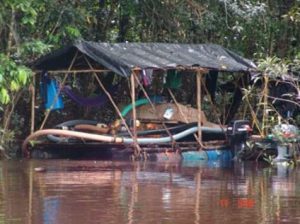Human rights group Kapé-Kapé denounced this week that illegal mining continues to destroy the traditional territory of the Pemón Indigenous tribe in southeastern Venezuela.
The civil society association issued a media statement this week saying that unregulated gold extraction is polluting the Carrao river and its tributaries within the Canaima National Park, in the Bolívar state.
This is the area that surrounds the so-called Mining Arc of the Orinoco River National Development Strategic Zone, a 111,843 square-kilometre concession area that is equivalent to 12.2% of the country’s landmass and where gold, diamond, iron ore, copper, bauxite, coltan, among other resources are allowed to be mined.
The creation of the Arc has been controversial since it was announced in 2016. Environmental and human rights groups have repeatedly called for a total halt of extractive activities in the area.

Illegal mining encampment in southern Venezuela. Photo by Kapé-Kapé.
According to Kapé Kapé, in and around the Mining Arc resources are being extracted indiscriminately and at the expense of the safety and livelihood of the Indigenous communities that have lived there for centuries.
“The rivers in the Canaima National Park are usually crystalline with a slightly reddish colour. From afar, these waters tend to look dark, blackish, but this is because of a lack of sediments and a high content of certain acidic substances. Nowadays, however, we see that these waters look brown and murky,” the communiqué states. “The reason behind such a transformation is no other than illegal mining, which is proliferating in this area that is protected by law and that occupies some 3 million hectares.”
The NGO goes on to say that Canaima is not the only protected area in southern Venezuela devastated by illegal mining. The Imataca forest reserve, the biosphere reserve of the High Orinoco, the Yapacana National Park and El Caura National Park are also threatened.
Kapé-Kapé noted that even though artisanal gold mining has been taking place in the Bolívar state for at least three decades, the practice has experienced a revival in recent years due to the presence of dissident guerrilla men from Colombia, who create alliances and gangs with the miners.
“Indigenous and non-Indigenous communities in the region have denounced this problem many times. They estimate that there are up to 2,000 gangmen carrying out criminal activities related to the exploitation of mineral resources in the southern part of the country,” the group said.
Besides deforestation and water pollution, the organization suggested the combination of illegal mining and organized crime is also causing social, cultural and economic degradation in Indigenous communities.
During consultations with local leaders, representatives of Kapé-Kapé were informed that the Pemón’s complaints usually fall on deaf ears as the area’s MPs and councillors, the Indigenous Ministry and the Advocacy Office for Indigenous Peoples don’t even respond when they are approached about these issues.
The post Venezuelan NGO says illegal mining runs rampant in protected, Indigenous land appeared first on MINING.com.
